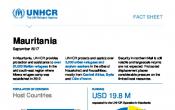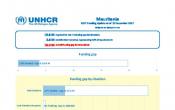Mauritania
Operation: Mauritania
Location
{"longitude":-10,"latitude":21,"zoom_level":0}
Latest update of camps and office locations 21 Nov 2016. By clicking on the icons on the map, additional information is displayed.
Key Figures
| 2018 planning figures | |
| 100% | of primary school-aged Malian refugee children in Mbera camp will be enrolled in primary education |
| 80% | of young refugees and asylum-seekers (aged 15-24) in urban areas will be enrolled in certified livelihoods training |
| 20% | of Malian refugees in Mbera camp will be supported in launching businesses/being self-employed for more than 12 months |
| 2016 year-end results | |
| 100% | of registered population in Mbera camp receive monthly food assistance |
| 72% | of primary school-aged children in Mbera camp attended primary school |
| 4,900 | people with specific needs receiving tailored assistance |
| 430 | adults attended literacy courses |
| 20 | litres of water were provided to all refugees in Mbera camp |
Latest Updates
People of Concern
4%
Decrease in
2016
2016
| 2016 | 74,735 |
| 2015 | 77,891 |
| 2014 | 76,048 |

[["Refugees",48148],["Refugee-like situation",26000],["Asylum-seekers",587]]
Loading ...
Mauritania
< Back
2016
{"categories":[2013,2014,2015,2016,2017,2018],"budget":[30.18104158,23.75815901,24.368373692,19.53236051,19.77346129,19.300354646],"expenditure":[22.20868457,14.42116683,13.02928311,14.17643259,null,null]}
{"categories":[2013,2014,2015,2016,2017,2018],"p1":[30.18104158,23.75815901,24.368373692,19.53236051,19.77346129,19.300354646],"p2":[null,null,null,null,null,null],"p3":[null,null,null,null,null,null],"p4":[null,null,null,null,null,null]}
{"categories":[2013,2014,2015,2016,2017,2018],"p1":[22.20868457,14.42116683,13.02928311,14.17643259,null,null],"p2":[null,null,null,null,null,null],"p3":[null,null,null,null,null,null],"p4":[null,null,null,null,null,null]}
Loading ...
CHOOSE A YEAR
- 2014
- 2015
- 2016
- 2017
- 2018
Year-end Overview
Plan Overview
Working environment
Mauritania has so far maintained its generous open-door policy towards refugees and asylum-seekers. Signatory to the Refugee Convention and OAU Convention, Mauritania is expected to adopt a national asylum law, formalizing refugee protection, including non-refoulement, civil rights and access to social services, in Mauritania. UNHCR works closely with national authorities, to promote knowledge and respect for refugee rights, and to lay the groundwork for the establishment of a national asylum system.
Due to the unstable situation in northern Mali, large scale returns of Malian refugees are not expected in 2018. UNHCR will continue to provide life-saving assistance to refugees in Mbera camp, targeting the most vulnerable. Moreover, UNHCR will continue to advocate with development actors to offer increased self-reliance opportunities for refugees and their host community in the Bassikounou region.
In urban areas, the number of people approaching UNHCR to claim asylum in Mauritania is expected to steadily increase. UNHCR will provide assistance to people with specific needs and increase their access to services (such as health and education), including training opportunities.
UNHCR works closely with the Government of Mauritania and the United Nations Country Team, to fully integrate refugees and asylum-seekers, in alignment with the development framework. UNHCR will continue to coordinate protection and assistance for refugees in Mauritania, in close cooperation with national authorities, other UN agencies, NGOs and donors.
Key priorities
UNHCR’s overall protection and solutions strategy for all refugees in Mauritania is based on five key components:
- Ensuring protection and access to essential services,
- Empowering refugees in becoming self-reliant,
- Supporting the host population to promote peaceful coexistence,
- Providing refugees with access to durable solutions, and
- Advocating with authorities towards the adoption of a national asylum law and issuance documentation for refugees in Mauritania.



